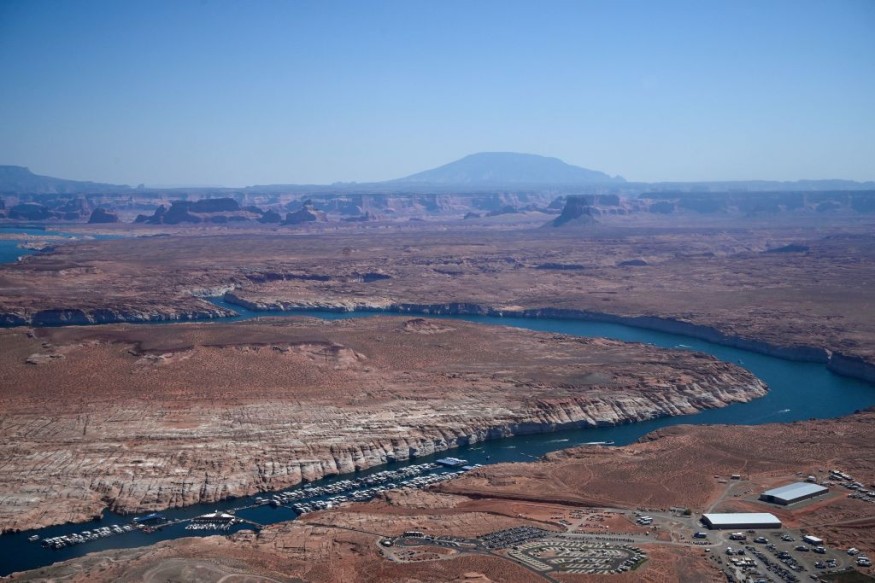Joe Biden Admin Plans to Save Colorado River by Cutting Water to Western States

The Joe Biden administration on Tuesday presented options to save the Colorado River in an effort to stop it from reaching critically low levels and to end months-long discussions between the seven western states and Indigenous groups that rely on it.
According to The Guardian, the U.S. Bureau of Reclamation, which manages water resources, urged the seven states, which are part of the Colorado River Basin, to find ways to reduce their river water allocation by as much as 30% due to decreasing water flow and reservoir levels falling to historic lows.
The Colorado River basin is divided into two: the Lower Basin includes Arizona, California, and Nevada, while Colorado, New Mexico, Utah, and Wyoming are part of the Upper Basin.
Despite several deadlines, these states have yet to make a deal on how to cut their usage to prevent dead pool.
A dead pool happens when water in a dam drops so low it can no longer flow downstream from the reservoir, with the waterline sitting beneath intake pipes at the Hoover Dam.
Last year, the Lake Mead reservoir dropped to its lowest level since the 1930s. The Interior Department said Tuesday it would impose cuts to water allotments based on the water-rights priority system or evenly across the board.
Without specifying how states should reduce water usage, the department defended its authority to ensure drinking water and hydropower generated from the river are met, even if that means bypassing the priority system.
The old system of dividing up the water used for over a century is based on a senior priority system or whichever one was there first among the states, putting California first.
Colorado River Supports Massive Agricultural Lands
According to Fox News, the Colorado River is 1,450 miles long and a significant water source for millions across the United States.
It also nourishes 5.5 million acres of farmland, generates power for millions of people via hydroelectric dams, and has essential recreational and ecological purposes.
The states in the Upper Basin rely on tributaries of the Colorado River for their water supply. In contrast, those in the Lower Basin rely on water stored in reservoirs like Lake Powell on the Utah-Arizona border and Lake Mead on the Nevada-Arizona border.
Water releases to the Lower Basin states can be managed by the dams at Glen Canyon in northern Arizona and Hoover in southern Nevada.
Water supplies and hydropower-generated electricity for tens of millions of Americans are in jeopardy due to decades of drought. Lake Powell and Lake Mead are nearing so-called dead pool levels when water cannot flow from a reservoir through its dam.
How Does Joe Biden's Admin Plan to Cut Water Affect Cities, Farmers, and Tribes?
In a press conference on Tuesday, Bureau of Reclamation Commissioner Camille Calimlim Touton said, "The Colorado River is one community comprised of 40 million people and landscapes that need us to get this right."
It comes as pressure mounts on the federal government to develop a fair deal for water users.
To demonstrate how much the water levels in Lake Mead have dropped, Touton and other officials spoke in front of the impressive bathtub ring.
While both situations would result in significant water restrictions, the primary distinction is who would be affected.
Because of their lower priority claim to the water than farmers and Native American tribes, big Western cities like Los Angeles, Las Vegas, and Phoenix would be forced to accept most of the reductions in water supply if Lake Mead levels continued to drop, CNN reported.
The second scenario considers the outcomes should the water cuts be applied uniformly to cities, farmers, and tribes, a course of action that some high-priority water users have warned might lead to a protracted, high-stakes legal battle between the states and the federal government.
The federal government also proposed a third scenario: do nothing. But with the Colorado River's continued decline, the Joe Biden administration needs to consider that alternative.
READ MORE : Nick Cannon Wants Baby No. 13 with Taylor Swift?
This is owned by Latin Post.
Written by: Bert Hoover
WATCH: Biden Administration Weighs in on Colorado River Water Rights Dispute - From CBS News
Subscribe to Latin Post!
Sign up for our free newsletter for the Latest coverage!
© 2025 Latin Post. All rights reserved. Do not reproduce without permission.










